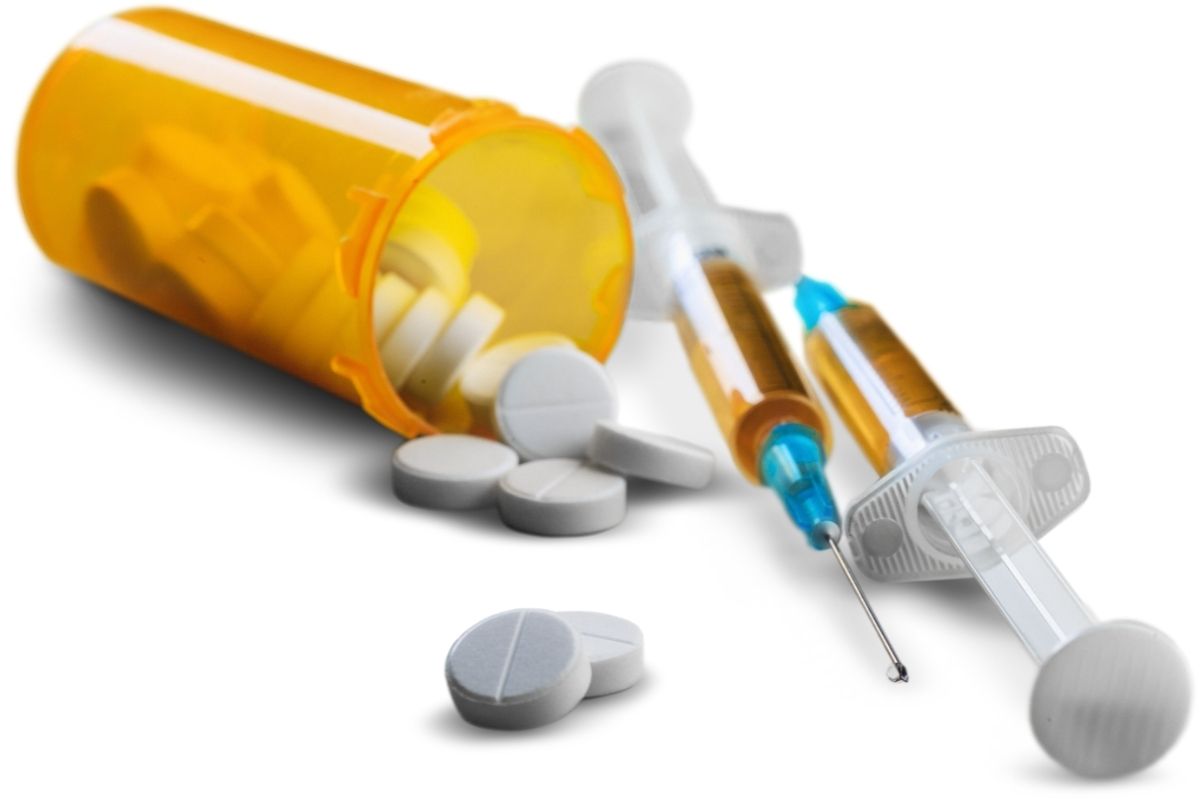Alcohol abuse is bad for you in so many ways, affecting your behavior, your liver, and your bank balance.
But consistent and excessive alcohol consumption can also have serious effects on your hormonal, endocrine system that aren’t quite as well known about.

So in this article, we’re going to focus on what excessive alcohol abuse can do to your hormonal endocrine system, and in particular your thyroid gland.
We will also attempt to answer all of your most frequently asked questions along the way, giving you everything you need to know.
Please feel free to scroll ahead to any section that jumps out at you. Here goes!
We’ll kick things off with a few basics before delving a little deeper.
What Is The Thyroid Gland, And What Does It Do?
The thyroid gland is located in your neck, just below your Adam’s apple. It produces hormones that control how quickly your body uses energy (metabolism), regulates your heart rate, and helps regulate growth and development.
Your thyroid is responsible for producing two main hormones: thyroxine (T4) and triiodothyronine (T3). T4 is the primary hormone produced by the thyroid, while T3 is an active form of T4.
In addition to regulating these hormones, the thyroid gland also stores iodine, which is needed for the production of T3.
The thyroid is part of the hypothalamo-pituitary-thyroid axis, which is a complex feedback loop between the brain, pituitary gland, and thyroid gland.
The pituitary gland releases thyroid stimulating hormone (TSH), which stimulates the thyroid gland to produce more thyroid hormones.
When there are too much or not enough thyroid hormones circulating in your blood, symptoms such as fatigue, weight gain, depression, hair loss, and dry skin may occur.
How Does Alcohol Affect The Thyroid?
Alcohol has been shown to interfere with the function of the thyroid gland. This means that when you drink alcohol regularly, your thyroid gland doesn’t work as well as it’s meant to.
There are three main reasons why alcohol affects your thyroid gland. Firstly, it interferes with the release of thyroid hormones from the thyroid gland itself.
We know this because people who consume large amounts of alcohol often experience low levels of thyroid hormones in their bloodstream.
Secondly, alcohol increases the amount of cortisol in your body. Cortisol is a stress hormone that can increase the activity of your thyroid gland.
If you drink alcohol regularly, then your adrenal glands will be working overtime to keep up with the increased demand caused by cortisol.
And finally, alcohol can interfere with the absorption of iodine into the thyroid gland. Iodine is required for the production of thyroid hormones.
When you drink alcohol regularly, you reduce the amount of iodine available to the thyroid gland.
Why Should You Care If Your Thyroid Isn’t Functioning Properly?
If your thyroid gland isn’t working properly, then it won’t be able to produce sufficient quantities of thyroid hormones.
These hormones play a vital role in maintaining health and well-being throughout life. They help us grow and develop, they maintain our metabolism, and they help regulate our moods.

If your thyroid is underactive, you could suffer from hypothyroidism. Hypothyroidism causes many different symptoms including tiredness, weight gain, constipation, muscle cramps, cold intolerance, depression, and difficulty losing weight.
Hypothyroidism is very common. In fact, one in every ten women over 40 years old suffers from hypothyroidism, compared to only one in every hundred men.
Hypothyroidism is usually diagnosed after other conditions have been ruled out. Your doctor will ask about any symptoms you’re experiencing, and conduct tests to check whether your thyroid gland is functioning normally.
If your thyroid gland is overactive, you’ll likely suffer from hyperthyroidism. Hyperthyroidism causes many similar symptoms to those experienced by someone with hypothyroidism.
However, these symptoms tend to come on quickly and last for just a few hours before returning to normal.
Hyperthyroidism is less common than hypothyroidism. It occurs in around 1 in every 200 people. Women are more at risk of developing hyperthyroidism than men.
To What Extent Is Alcohol Abuse A Risk Factor For Hypothyroidism?
The evidence suggests that alcohol consumption may be linked to an increased risk of hypothyroidism. A study published in 2012 found that regular drinkers were almost twice as likely to develop hypothyroidism as non-drinkers.
This was true even when the researchers took account of factors such as age, gender, smoking status, BMI, physical activity, and family history of thyroid disease.
The authors of this study also concluded: “Our findings suggest that moderate drinking may not be protective against hypothyroidism.”
To What Extent Is Alcohol Abuse A Risk Factor For Hyperthyroidism?
There’s no clear evidence that alcohol consumption increases the risk of hyperthyroidism per se.
However, there is some evidence suggesting that excessive alcohol consumption can contribute to the development of Graves’ disease.
Graves’ disease is an autoimmune condition where the body attacks its own thyroid gland. This leads to an increase in the production of thyroid hormone. Graves’ disease is more common among women than men.
Can Alcohol Abuse Exacerbate Pre-Existing Thyroid Problems?
It is known that alcohol abuse can make thyroid disorders worse. For example, heavy drinking has been shown to worsen symptoms of both hypo- and hyperthyroidism.
In addition, alcohol use has also been associated with higher rates of goiter (a swelling of the thyroid). The exact mechanism behind this association is unclear.

When Should You Seek Medical Advice If You Suspect That Your Thyroid Isn’t Functioning Correctly?
The first thing you need to do is contact your GP. He or she will be able to advise you on what steps to take next. You may want to consider seeing an endocrinologist (a specialist doctor) if your symptoms don’t improve within six months.
Your GP will also be able to refer you to an endocrinologist if he or she thinks that you might benefit from further testing.
How Can You Treat Thyroid Problems?
There’s no cure for thyroid problems as such. But there are ways to manage them. The most important step is to make sure that your thyroid gland is producing enough thyroid hormones. This means taking supplements containing natural thyroid hormones.
You can find natural thyroid hormones online or through your local pharmacy.
Another option is to use a medication called levothyroxine. Levothyroxine is a synthetic thyroid hormone which works by replacing the naturally occurring thyroid hormones produced by your body.
Levothyroxine is taken once daily. If you’ve had a thyroidectomy, you may require higher doses of this medication. Speak to your GP about how much you need.
Symptoms of Hypothyroidism
Hypothyroidism can result in numerous symptoms that can interfere with a happy and healthy life. The most common symptoms associated with hypothyroidism include fatigue, weight gain, feeling very cold, hair loss and dry skin.
Other symptoms resulting from hypothyroidism include:
- Slower movement
- Slowed speech
- Puffy/swollen face
- Hoarse voice
- Swollen thyroid gland
- Difficulty concentrating
- Difficulty focusing
- Depression
- Forgetfulness
- Decreased energy
- Weak muscles
- Constipation
- Swollen feet and/or ankles
- Pain in the muscles and joints
- Irregular bleeding and menstrual cycles
It is important to talk with your doctor if you are experiencing any of these symptoms, especially if you tend to consume high amounts of alcohol.
Hypothyroidism makes it hard for the thyroid to produce the right amount of thyroid hormone. When the hypothalamus and pituitary detect low levels of the thyroid hormone level, they produce higher levels of other hormones which leads to the above symptoms.
How Do You Know If Your Thyroid is Working Correctly?
If you are experiencing unusual symptoms, ask your doctor for a TSH test which will check your blood to determine how much thyroid-stimulating hormone is present.
How Do I Know if Alcohol is Affecting My Thyroid?
Alcohol abuse affects every organ in your body, including the thyroid gland. If you are diagnosed with hypothyroidism, it is important to do everything you can to support it and help your body operate at its best. Decreasing your alcohol intake may be something to consider if you are experiencing problems with your thyroid.
How Much Alcohol Affects My Thyroid?
This is a little more complicated. According to the USDA’s dietary guidelines, alcohol consumption is safe for the body in moderation. But what is moderation? According to the USDA, moderation is defined as one drink per day for women and two drinks per day for men. Increased drinking or binge drinking can result in several health issues, including damage to the endocrine system.
Studies show that heavy alcohol use can result in significant thyroid problems, namely the development of hypothyroidism. Heavy alcohol use can reduce the thyroid hormones, T4 and T3 and weakens the thyroid-stimulating hormone (TSH) response to thyrotropin-releasing hormone (TRH) from the hypothalamus gland.
Alcohol Abuse and Thyroid Damage Can Affect Your Mood
Some of the most common symptoms of alcohol abuse involve mood disorders. Because thyroid problems result in mood disorders such as depression, these two things may be a direct result of each other. If you are experiencing changes in your mood such as depression, fatigue or anxiety and you have a history of heavy alcohol consumption you may want to get your thyroid checked. See your doctor for more information.
A Healthy Lifestyle Can Help
Symptoms of hypothyroidism can interfere with your ability to enjoy a happy and healthy life. If you are diagnosed with hypothyroidism, one of the best things you can do is limit your alcohol intake to support a healthier and happier lifestyle.
Alcohol abuse can also affect a person’s sleep habits which can lead to increased problems with mood and depression. All of these things combined can make the symptoms of hypothyroidism worse.
Wrap Up
So, it appears that alcohol consumption can impact the thyroid gland in multiple ways, making it underactive in some ways and overactive in others.
There is evidence to suggest that alcohol consumption can lead to an increased risk of hypothyroidism, where the thyroid is underactive, Grave’s disease, where the thyroid is attacked by the immune system, and swelling of the thyroid. It can also exacerbate the symptoms of any pre-existing thyroid conditions.
It is important that you look after your thyroid and hormonal systems because it governs your body’s metabolism and helps regulate your heart rate.
And, as they say, prevention is better than cure. So with alcohol being so disruptive to your body in general and to the thyroid, responsible drinking, or going tee-total is advised.
- Overcoming Emotional Intimacy Challenges With Alcohol Misuse - November 18, 2023
- Overcoming Alcohol's Impact on Emotional Intimacy: 13 Essential Tips - November 18, 2023
- 6 Ways to Overcome Emotional Intimacy Challenges With Alcohol - November 18, 2023










